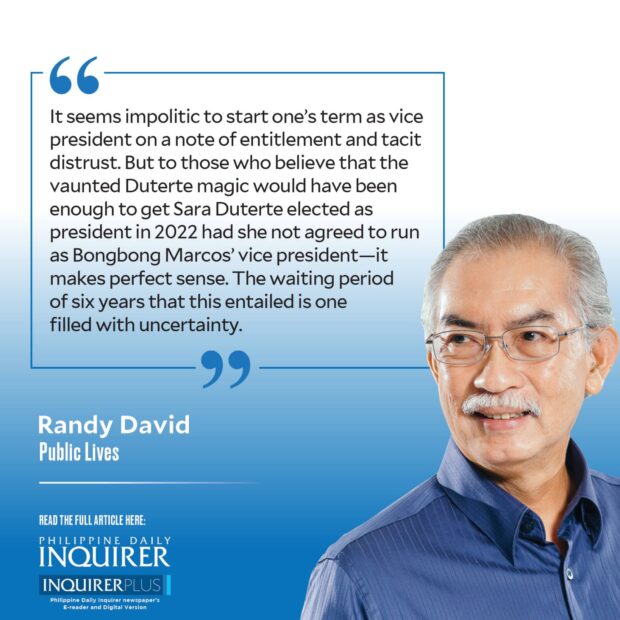Securing a president-in-waiting
When Sen. Risa Hontiveros asked Vice President Sara Duterte what it is in the mandate of her office that justifies allotting P500 million for confidential and intelligence funds (CIF) in its proposed budget, Duterte’s first instinct was to let her chief of staff offer an answer. The soft-spoken Risa courteously insisted that it might be more appropriate for Duterte herself to respond to the question.
When she did, Duterte could not avoid acknowledging the fact that the vice president was indeed, in her own words, “a reserve, a benchwarmer, in the event of … I do not want to mention it, but in the event that the president cannot discharge his functions.” She probably realized it was presumptuous to justify these funds as necessary to her own personal security as a president-in-waiting. Whereupon she proceeded to justify her outsize confidential funds by invoking the well-worn mantra that these funds were “intended for the safe, secure, and successful implementation of programs, projects, and activities and engagements of the OVP (Office of the Vice President) and all its satellite offices.” But the senator had made her point: These special funds appear to have nothing to do with the office itself but with the needs of the person occupying it.
Article continues after this advertisementFormer vice president Leni Robredo never asked for a single centavo of CIF. Coming from a party different from that of then President Rodrigo Duterte, who made no secret of his hostility toward her, Robredo would perhaps have been more justified in seeking such funds.
In contrast, from the moment she was sworn in as vice president, Duterte had seemed obsessed with her personal safety. As Inquirer reporter Dexter Cabalza wrote in a June 26, 2022 piece (“Guarding Sara: Why next VP is getting own security team,” News), one of her first official acts was to send a request to the Department of National Defense for the creation of “a security unit separate from the Presidential Security Group … [to] be assigned to the Office of the Vice President.” The new unit, to be known as the Vice Presidential Security and Protection Group, is a lot bigger (with 433 security personnel) than the Vice Presidential Security Detachment that served as security detail to all past vice presidents. Robredo had 78 detailed military personnel in 2021.
And what was the rationale for the new and expanded security unit? I quote from the same Inquirer report: “A day after the launching of the Vice Presidential Security and Protection Group on Friday, Duterte herself issued a statement acknowledging that a ‘request’ has been made for the formation of that group, in anticipation of ‘future elections’ and the possibility of ‘strained relations’ under that scenario between the president and vice president.”
Article continues after this advertisementIt seems impolitic to start one’s term as vice president on a note of entitlement and tacit distrust. But to those who believe that the vaunted Duterte magic would have been enough to get Sara Duterte elected as president in 2022 had she not agreed to run as Bongbong Marcos’ vice president—it makes perfect sense. The waiting period of six years that this entailed is one filled with uncertainty. As with all coalitions of convenience formed in Philippine politics, pledges are as good only as the election in which they are made.
One gets a sense of this unfolding scenario with the recent political marginalization of former president Gloria Macapagal Arroyo, who had played a key role in the forging of the Marcos-Duterte alliance for the 2022 presidential election. The Duterte elder himself had been against this partnership from the start, but he kept his mouth shut as soon as his daughter made up her mind. These days, he has been less reticent in airing his disparaging views of Marcos’ administration, especially with regard to the latter’s handling of the China question.
I foresee that the country’s relations with the United States and China will increasingly take center stage as the 2028 presidential election looms on the horizon. If this happens, there are two possible complications that need to be managed with utmost care and discernment by our political leaders.
The first stems from the deep emotional residue that the American colonial legacy has deposited in every aspect of our national life. This legacy has shaped the choices we make as a country long after the 1946 formal declaration of independence. The first real break we had from this colonial attachment occurred only in 1991 when the Philippine Senate rejected the continued stay of American bases under a new treaty. But that euphoric moment has since been canceled by the series of agreements that allow US forces to occupy Philippine military facilities as part of the country’s protection against Chinese aggression in the South China Sea. America’s role as protector is easy enough for the public to understand. But do we really want the country to serve as a forward base in the US-led containment of China?
This brings us to the second complication, which, as restrained as it may be for now, could pose a real danger. Here, I refer to the risk of a strident anti-China policy quickly ripening into full-blown racism directed against all Chinese people the moment it enters the electoral arena as an issue. It would be unpardonable, to say the least, for any politician to attempt to win an election by reaping the low-hanging fruit of racial prejudice.
—————-
public.lives@gmail.com

















